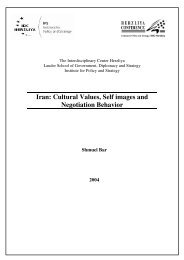Bashar's Syria: The Regime and its Strategic Worldview Shmuel Bar ...
Bashar's Syria: The Regime and its Strategic Worldview Shmuel Bar ...
Bashar's Syria: The Regime and its Strategic Worldview Shmuel Bar ...
You also want an ePaper? Increase the reach of your titles
YUMPU automatically turns print PDFs into web optimized ePapers that Google loves.
418 S. <strong>Bar</strong>It was Russia, however, that has been in <strong>Syria</strong>n eyes the most important counterbalanceto the U.S. Whereas in the past relations with Russia/USSR were necessary in order to balanceIsrael’s relations with Washington, today the U.S. is seen not merely as a superpowersupporting <strong>Syria</strong>’s regional archenemy, but as an enemy of <strong>Syria</strong> in <strong>its</strong> own right. <strong>The</strong>refore,the <strong>Syria</strong>n need for a strong relationship with Russia has only increased. In January 2005,Bashar al-Asad visited Moscow, finally settling the issue of <strong>Syria</strong>’s $12 billion debt to theformer Soviet Union <strong>and</strong> holding talks on the possibility of the sale of advanced Russianweaponry to <strong>Syria</strong>. Russian spokesmen lauded <strong>Syria</strong>’s regional role <strong>and</strong> the special relationshipbetween the two countries. It is clear to Bashar, however, that he cannot expecthelp from Russia against U.S. <strong>and</strong> French plans in the UN, or if the U.S. makes a decisionto topple the <strong>Syria</strong>n regime by force.<strong>The</strong> United States<strong>The</strong> United States has always been viewed from Damascus both as an adversary, given <strong>its</strong>role as Israel’s most important strategic ally, <strong>and</strong> as a necessary interlocutor. <strong>The</strong>refore,even in times of high tension with the United States, <strong>Syria</strong> under Hafez al-Asad did not giveup on dialogue with Washington, <strong>and</strong> channels of communication remained open. <strong>The</strong> factthat President Bush’s “Axis of Evil” did not include <strong>Syria</strong> was seen as evidence that the<strong>Syria</strong>n regime, unlike those of Iran, Iraq, <strong>and</strong> North Korea, essentially remained legitimatein eyes of the U.S. administration.This sense of assurance has eroded since the fall of the Saddam Hussein regime. <strong>Syria</strong>now sees Washington as moving inexorably toward delegitimization of the <strong>Syria</strong>n Ba’thregime as well. 147 This analysis is based on the following: <strong>The</strong> U.S. position on democratization as a major balm for the plague of terrorismplaces change of nondemocratic regimes—particularly those which are traditionallyhostile to the US <strong>and</strong> supporters of terrorism—high on the American political agenda.<strong>The</strong> identification of the <strong>Syria</strong>n regime as “Ba’thist,” like the former Iraqi regime,only exacerbates this feeling. Developments in Lebanon make <strong>Syria</strong> “low-hanging fruit” in regard to regimechange. Positive regime change in Damascus can be used by the administrationto show an achievement <strong>and</strong> to balance the lack of success in the Iraqi theater. <strong>The</strong> desertion of France, which had been a traditional friend of <strong>Syria</strong> <strong>and</strong> supportedBashar in his first days as president, leaves <strong>Syria</strong> without support from a strongEuropean ally. <strong>Syria</strong> fears that American delegitimization of the <strong>Syria</strong>n regime will harden Israelistance toward it <strong>and</strong> give it free run to react to Hezbollah attacks <strong>and</strong> terrorist attacksin Israel perpetrated by <strong>Syria</strong>n-based organizations. Under these circumstances, <strong>Syria</strong>believes that Israel will not enter into negotiations with <strong>Syria</strong> on the Golan. Negotiatonswith Israel or even willingness to hold them has always been a significant leverfor <strong>Syria</strong> to achieve international acceptance, in spite of <strong>its</strong> support of terrorism, lackof democracy, etc.Nevertheless, there is no doubt that Bashar would like to reach out to the U.S. Heis eager for any contact with the administration with which he can mitigate the Americanhostility toward him. Recognizing the priority of the war on terror for the U.S. Bashar hopedimmediately after 9/11 to acquire the good will of the administration through cooperation onintelligence on al Qaeda. However, his perception that the administration is intent on topplinghis regime lim<strong>its</strong> his ability to enter into any real “give <strong>and</strong> take” dialogue over the few
















